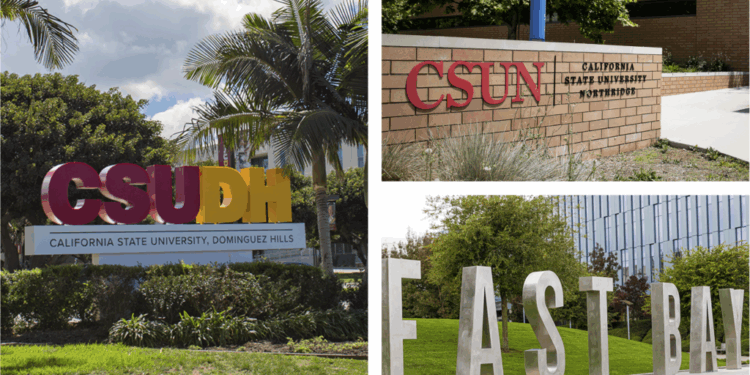The requirements come as other schools scale back their DEI missions amid a Trump administration crackdown

The University of California system made news earlier this year when it eliminated mandatory diversity statements for new hires. But at California’s other public university system, DEI isn’t in retreat—it’s required.
Nearly every California State University campus requires students to pass at least one diversity and cultural competency class, according to graduation criteria identified by Do No Harm, a group that opposes identity politics in medicine. The exact requirements vary across schools, but they typically prescribe a specific course or allow students to pick from a list of classes that “explore the interrelatedness and intersection of race and ethnicity with class, gender and sexuality, and other forms of difference, hierarchy, and oppression.”
San Francisco State University has among the most demanding criteria, requiring students to take courses in “areas that the campus feels are important to graduates”: American ethnic and racial minorities, environmental sustainability and climate action, global perspectives, and social justice. Some classes cover several requirements, like “Queer Crip Lit,” which examines “connections between ableism and other forms of discrimination, such as racism, sexism, classism, homophobia, and transphobia” in literary works. Another class that covers multiple requirements: “Decolonize Your Diet: Food Justice and Gendered Labor in Communities of Color” focuses on “food justice in communities of color addressing issues including sex/gender and food production, racism and attacks on traditional food systems.”
Some Cal State schools require students to take two DEI courses, one with a domestic focus and another centering on global issues. Students at the Humboldt campus can satisfy the domestic requirement with “Decolonizing Public Health,” which applies “decolonizing methodologies and anti-racism interventions to analysis of public health frameworks.” The options on the international side are more straightforward, though among the classes offered is “Sex, Class and Culture: Gender and Ethnic Issues in International Short Stories.”
Do No Harm senior director of programs Laura Morgan said the Cal State system “is all in on politicized propaganda.”
“These classes are based on concepts that have roots in critical race theory and promote ideology instead of sound learning principles,” Morgan told the Washington Free Beacon in a statement. “As a taxpayer-funded system, [Cal State] is obligated to prioritize education instead of operating a factory for politically indoctrinated activists.”
Indeed, even though Cal State doesn’t officially demand that its 22 campuses require a DEI course, the university system does have a “Diversity/Inclusivity Style Guide” aimed at “setting the example for inclusiveness.” It advises against using “male/man” and “female/woman” since “not everyone falls into those categories” and suggests avoiding terms like “prehistoric,” which “implies an absence of history” and may be offensive to Native Americans.
Cal State’s DEI requirements come as universities scale back—or attempt to obscure—their DEI missions as the Trump administration cracks down on discriminatory practices nationwide. George Mason University, for example, dismantled its racially focused projects in August amid multiple federal investigations.
Under California law, Cal State students are required to take an ethnic studies course—but those are separate from the campuses’ DEI requirements. In some cases, the DEI courses specifically indicate that they won’t count toward the ethnic studies requirement. Others use the mandate to push a DEI mission—Cal State, East Bay, notes that after completing the ethnic studies requirement, students will have a strong understanding of concepts like white supremacy, critical race theory, and intersectionality.
Other campuses build DEI into required classes that otherwise seem standard. A mandatory oral communications class at Cal State, Dominguez Hills, teaches “rhetorical sensitivity to diversity, equity, inclusion, belonging, and accessibility.”
Of the few Cal State campuses that don’t explicitly require students to take a diversity- or culture-centered course, most bake DEI missions into their learning goals for students. One of Sacramento State’s objectives for its general education requirements is to provide students with “a significant and useful understanding of peoples from a diversity of cultures and backgrounds.” In July, that school’s president, Luke Wood, said he wanted to “eliminate” “whiteness.”
Other campuses lump their DEI courses in with other general education classes, so they’re technically not mandated but could be taken to fulfill other requirements. At Cal State, Northridge, for example, students who don’t want to take a foreign language can instead enroll in a DEI course like “The Black Family,” which examines topics like “structural oppression and the system of white supremacy” “through the lens of Black empowerment and resilience.”
Two Cal State schools didn’t have any DEI course requirements, but that may be a new development: Both Cal Maritime and Cal State, Monterey Bay, removed references to their DEI mission statements and committees from their websites earlier this year.
Cal State spokeswoman Amy Bentley-Smith acknowledged that some campuses maintain “requirements focused on diversity, multiculturalism, and/or social justice.”
“These graduation requirements are typically ‘double counted’ with other general education and/or major requirements and do not add units to the degree program,” she told the Free Beacon. “Campus-specific requirements reflect each campus’s educational mission and values, ensuring that graduates leave with a well-rounded understanding of and broader competencies in social responsibility, civic engagement, and cross-cultural awareness.”

















